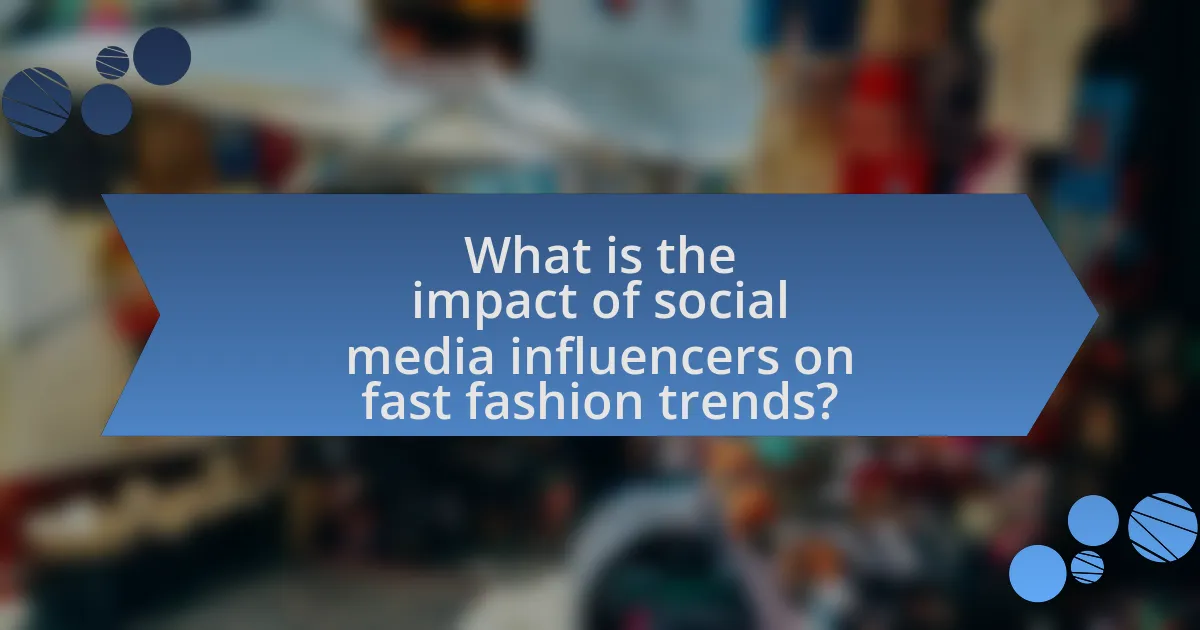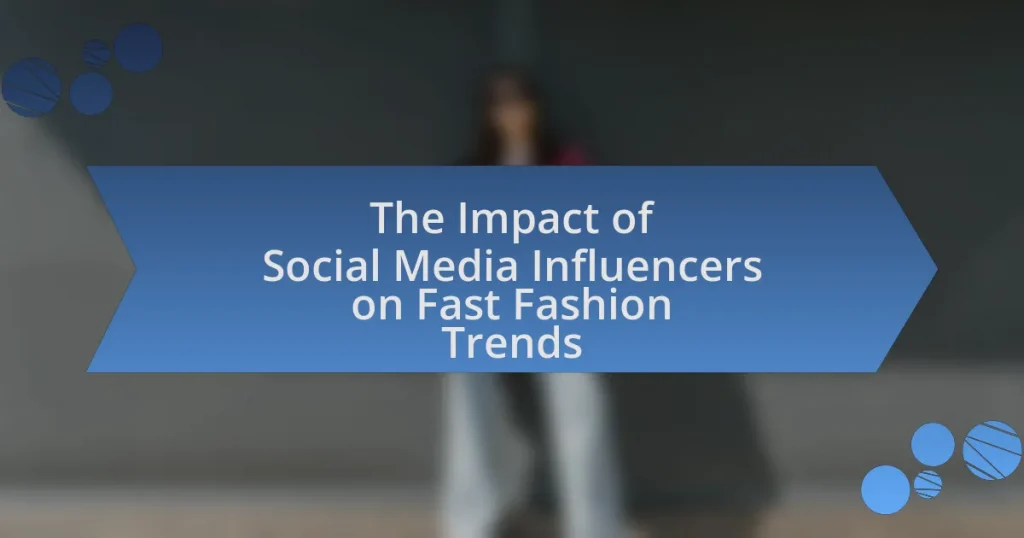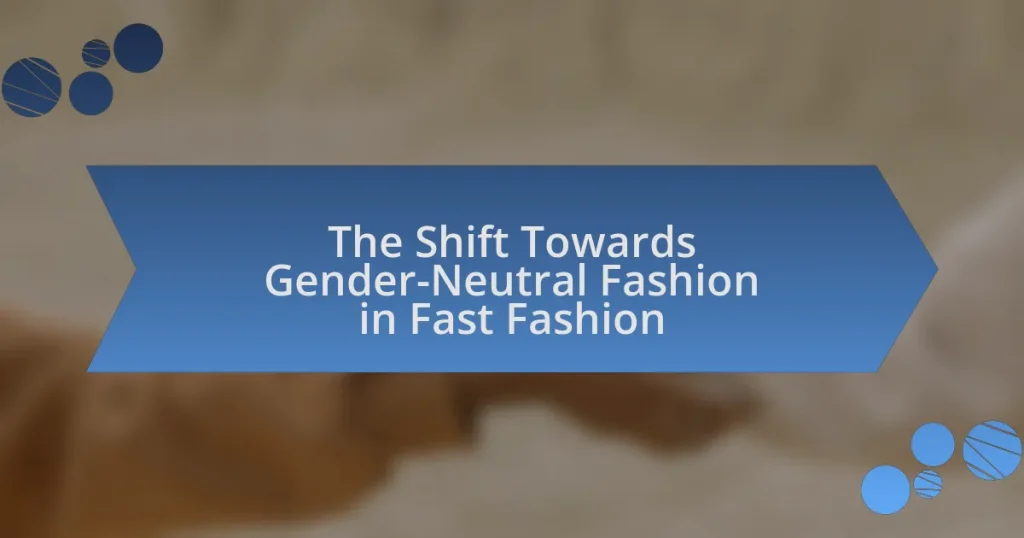The article examines the significant impact of social media influencers on fast fashion trends, highlighting how their promotional activities drive consumer demand and shape purchasing behavior. It discusses the role of influencers in creating urgency around new styles, with research indicating that a substantial percentage of young consumers rely on their recommendations. The article also addresses the economic implications of influencer marketing for fast fashion brands, the ethical concerns surrounding their partnerships, and the environmental issues exacerbated by fast fashion consumption. Additionally, it explores strategies for promoting sustainable fashion and best practices for consumers when engaging with fashion influencers.

What is the impact of social media influencers on fast fashion trends?
Social media influencers significantly shape fast fashion trends by rapidly promoting new styles to their followers, leading to increased consumer demand. Their ability to showcase outfits in real-time and engage with audiences creates a sense of urgency and trendiness around specific clothing items. For instance, a study by the University of Southern California found that 70% of young consumers are influenced by social media posts when making fashion purchases. This influence drives brands to quickly produce and market items that align with the latest trends, often resulting in shorter product life cycles and increased sales for fast fashion retailers.
How do social media influencers shape consumer behavior in fast fashion?
Social media influencers significantly shape consumer behavior in fast fashion by leveraging their reach and credibility to promote brands and products. Influencers create a sense of urgency and desirability through curated content, often showcasing the latest trends and styles, which drives their followers to make impulsive purchasing decisions. Research indicates that 49% of consumers rely on influencer recommendations for their buying choices, highlighting the effectiveness of influencer marketing in this sector. Additionally, platforms like Instagram and TikTok facilitate visual storytelling, allowing influencers to engage audiences emotionally, further enhancing their impact on consumer behavior in fast fashion.
What role do influencers play in promoting fast fashion brands?
Influencers play a crucial role in promoting fast fashion brands by leveraging their large social media followings to create awareness and drive consumer engagement. They showcase the latest trends and styles from fast fashion retailers, often through visually appealing content that resonates with their audience. This strategy effectively influences purchasing decisions, as studies indicate that 49% of consumers rely on recommendations from influencers when making fashion purchases. Additionally, influencers often collaborate with brands for sponsored posts, further amplifying brand visibility and credibility in the fast fashion market.
How do followers perceive the authenticity of influencers in the fashion industry?
Followers perceive the authenticity of influencers in the fashion industry primarily through their relatability, transparency, and engagement. Research indicates that influencers who share personal stories and behind-the-scenes content are viewed as more genuine, fostering a sense of trust among their audience. A study published in the Journal of Business Research found that 61% of consumers are more likely to trust influencers who openly discuss their experiences and challenges, rather than those who solely promote products. Additionally, consistent interaction with followers, such as responding to comments and messages, enhances the perception of authenticity, as it creates a more personal connection. This relational dynamic is crucial in the fashion industry, where followers often seek validation and inspiration from influencers they consider authentic.
Why is the relationship between social media influencers and fast fashion significant?
The relationship between social media influencers and fast fashion is significant because influencers drive consumer behavior and trends, leading to rapid sales and increased brand visibility for fast fashion companies. Influencers often showcase new styles and products to their followers, creating a sense of urgency and desire for the latest trends. For instance, a study by the University of Southern California found that 70% of young consumers are influenced by social media when making fashion purchases, highlighting the powerful impact influencers have on fast fashion consumption. This dynamic not only boosts sales for brands but also shapes the fashion landscape, making it more trend-driven and responsive to social media engagement.
What are the economic implications of influencer marketing for fast fashion brands?
Influencer marketing significantly boosts sales and brand visibility for fast fashion brands. By leveraging social media influencers, these brands can reach targeted demographics effectively, resulting in increased consumer engagement and higher conversion rates. For instance, a study by the Digital Marketing Institute found that 49% of consumers depend on influencer recommendations when making purchase decisions, highlighting the economic impact of influencer partnerships. Additionally, fast fashion brands often experience a rapid turnover of inventory, and influencer marketing accelerates this process by creating urgency and trend-driven demand, leading to improved cash flow and profitability.
How does influencer marketing affect brand loyalty among consumers?
Influencer marketing significantly enhances brand loyalty among consumers by fostering trust and relatability. When consumers perceive influencers as authentic and relatable, they are more likely to develop a positive emotional connection with the brands promoted by these influencers. Research indicates that 49% of consumers depend on influencer recommendations for their purchasing decisions, which underscores the effectiveness of influencers in shaping consumer perceptions and loyalty. Additionally, a study published in the Journal of Business Research found that consumers who engage with influencer content exhibit higher levels of brand loyalty, as they feel a sense of community and belonging associated with the brand. This connection is particularly potent in the fast fashion sector, where trends rapidly evolve, and consumers seek guidance from trusted figures.
What are the potential drawbacks of social media influencers on fast fashion trends?
Social media influencers can significantly contribute to the drawbacks of fast fashion trends by promoting excessive consumption and fostering unsustainable practices. Their endorsements often lead to rapid purchasing behaviors among followers, resulting in increased waste and environmental degradation. For instance, a study by the Ellen MacArthur Foundation highlights that the fashion industry is responsible for 10% of global carbon emissions, with fast fashion being a major contributor due to its high turnover rates and low-quality production. Additionally, influencers may inadvertently perpetuate a culture of disposability, where clothing is viewed as temporary and easily replaceable, further exacerbating the environmental impact.
How does fast fashion contribute to environmental issues through influencer promotion?
Fast fashion contributes to environmental issues through influencer promotion by encouraging excessive consumption and rapid turnover of clothing. Influencers often showcase new outfits frequently, creating a perception that consumers need to buy more to stay trendy. This behavior leads to increased production, which is responsible for significant environmental degradation, including water pollution and high carbon emissions. For instance, the fashion industry is estimated to produce 10% of global carbon emissions and is the second-largest consumer of the world’s water supply. Influencer-driven marketing amplifies these effects by normalizing a throwaway culture, where garments are discarded after minimal use, further exacerbating waste and pollution.
What are the ethical concerns surrounding influencer partnerships with fast fashion brands?
Influencer partnerships with fast fashion brands raise significant ethical concerns primarily related to sustainability, labor practices, and consumerism. Fast fashion is known for its detrimental environmental impact, contributing to pollution and waste due to the rapid production cycles and low-quality materials used. Additionally, many fast fashion brands have been criticized for exploiting workers in developing countries, where labor conditions are often unsafe and wages are insufficient. Influencers promoting these brands can inadvertently endorse these unethical practices, perpetuating a cycle of overconsumption and environmental degradation. Research indicates that the fashion industry is responsible for 10% of global carbon emissions, highlighting the urgency of addressing these ethical issues.
How do social media platforms facilitate influencer impact on fast fashion?
Social media platforms facilitate influencer impact on fast fashion by providing a direct channel for influencers to showcase products to their followers, thereby driving consumer engagement and purchasing decisions. Platforms like Instagram and TikTok allow influencers to create visually appealing content that highlights fast fashion items, often leading to viral trends. For instance, a study by the University of Southern California found that 70% of young consumers are influenced by social media when making fashion purchases, demonstrating the significant role these platforms play in shaping consumer behavior. Additionally, the immediacy of social media enables influencers to promote limited-time offers and collaborations, further enhancing the urgency and appeal of fast fashion items.
What features of platforms like Instagram enhance influencer reach in fashion marketing?
Instagram’s features such as Stories, IGTV, and shopping capabilities significantly enhance influencer reach in fashion marketing. Stories allow influencers to share ephemeral content that engages followers in real-time, fostering a sense of urgency and connection. IGTV provides a platform for longer video content, enabling influencers to showcase fashion items in detail, which can lead to higher viewer retention and engagement. Additionally, Instagram’s shopping features, including shoppable posts and product tags, streamline the purchasing process, allowing followers to buy items directly from influencers’ posts, thus increasing conversion rates. According to a 2021 report by the Influencer Marketing Hub, 63% of consumers trust influencers’ recommendations, highlighting the effectiveness of these features in driving sales and brand awareness in the fashion industry.
How do algorithms influence the visibility of fashion content created by influencers?
Algorithms significantly influence the visibility of fashion content created by influencers by determining which posts are shown to users based on engagement metrics. Social media platforms like Instagram and TikTok utilize algorithms that prioritize content with higher likes, comments, and shares, thereby increasing the likelihood that such posts will appear in users’ feeds. For instance, a study by the Pew Research Center indicates that 70% of users are more likely to engage with content that has already received substantial interaction, reinforcing the visibility of popular posts. Consequently, influencers who create engaging and relatable fashion content are more likely to be promoted by these algorithms, leading to greater exposure and impact on fast fashion trends.
What strategies can influencers adopt to promote sustainable fashion trends?
Influencers can promote sustainable fashion trends by showcasing eco-friendly brands and practices through their platforms. By collaborating with sustainable fashion labels, influencers can highlight the importance of ethical production and environmentally friendly materials. For instance, influencers can create content that emphasizes the benefits of second-hand shopping or upcycling, which not only reduces waste but also encourages their followers to make conscious purchasing decisions. Research indicates that 66% of consumers are willing to pay more for sustainable brands, demonstrating the potential impact influencers can have on consumer behavior when they advocate for sustainability.
How can influencers educate their audience about ethical fashion choices?
Influencers can educate their audience about ethical fashion choices by sharing informative content that highlights sustainable brands, ethical production practices, and the environmental impact of fast fashion. For instance, influencers can create posts or videos that compare the lifecycle of fast fashion items with those from ethical brands, illustrating the benefits of choosing sustainable options. Research from the Fashion Institute of Technology indicates that consumers are more likely to make ethical choices when they are informed about the consequences of their purchases, demonstrating that education can significantly influence consumer behavior. By leveraging their platforms to disseminate this information, influencers play a crucial role in promoting ethical fashion awareness.
What collaborations can influencers pursue to support sustainable fashion brands?
Influencers can pursue collaborations with sustainable fashion brands through partnerships that include sponsored content, product endorsements, and co-designed collections. These collaborations allow influencers to leverage their platforms to promote eco-friendly practices and raise awareness about sustainable fashion. For instance, influencers can create engaging social media campaigns that highlight the ethical production processes and materials used by sustainable brands, thereby educating their audience on the importance of conscious consumerism. Research indicates that influencer marketing can significantly impact consumer behavior, with 49% of consumers relying on influencer recommendations when making purchasing decisions. This demonstrates the potential effectiveness of influencer collaborations in driving support for sustainable fashion brands.
What are the best practices for consumers when engaging with fashion influencers?
Consumers should verify the authenticity and credibility of fashion influencers before engaging with them. This involves checking the influencer’s follower count, engagement rates, and the quality of their content to ensure they have a genuine influence in the fashion industry. Research indicates that influencers with higher engagement rates often provide more reliable fashion advice, as they have established trust with their audience. Additionally, consumers should be aware of sponsored content and disclose any partnerships, as transparency is crucial for informed decision-making. Engaging with influencers who align with personal values and aesthetics can enhance the shopping experience and lead to more satisfying purchases.















